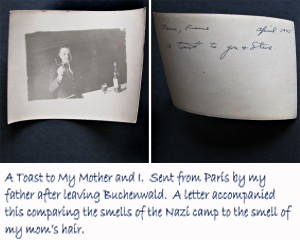My uncle George was a forward artillery spotter in the 89th Division. He was an intensely intellectual man who spoke seven languages, including German, a couple European languages, and Arabic (the army at first sent him to Princeton to study the latter). When George was assigned to combat duties, they gave him the extra role of battalion translator. One day he and his jeep-mounted unit received radio orders to report to a set of map coordinates. George became the first US army translator to walk into Buchenwald upon its liberation. He spent a couple days working there. I gather the sights of the camp affected his world-view quite significantly.
There is not much more I can tell you of Sgt. George Lockard’s experiences at Buchenwald. George, a career civil servant with the Veterans Administration, died in 1964. I know this much only because my father, his older brother, visited briefly with George and his unit after they had crossed the Rhine. They saw a good deal of combat and soldiers in artillery spotting units did not expect to live through the war. George’s antipathy towards Germans was already well in place before he encountered Buchenwald. After VE Day, while his unit was still patrolling in Germany, I’m told that George would assist DPs walking home by apportioning them sheep from neighboring farms in order to eat or sell.
